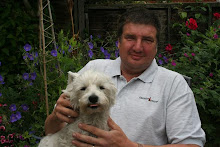 |
Now, there's taste in Birthday presents,
a straw skep. |
With Liz having been away on the actual date of my Birthday, she proposed that I should have a second "Official" birthday on the next available day so that I could catch up on the missing presents and coffee in bed and the special meal. We decided on Saturday (25th) and I had a lovely day being spoiled. The presents had a decidedly bee-keeping flavour and included the lovely straw 'skep' in the pic. Every home should have one, don't you agree? These were the actual hives back in the days before modern wooden hives were designed but had the disadvantage that you could not remove the honey on portable frames like we can now, so the colony had to be destroyed at harvest time to get the honey out.

Nowadays, we do not willingly destroy our bee colonies,and the skeps are used as swarm-catching baskets; they are much better than cardboard boxes or other containers because the bees can cling to the inside and hang on in there while you move them about. I also think they are beautiful artifacts so I have wanted one since we had bees, even though I am not at all sure I will ever get the chance to use it in anger.
 |
| Beef Wellington. Happy Birthday to me! |
The meal was a treat, which we served on our best table linen ( a gift from Montenegro via 'Steak Lady'; thanks SL). Liz did a starter of langoustines and the main course was a Beef Wellington of rare scrumptiousness; the 'duxelle' mix round the meat was mushroom, onions and bacon. Dessert was a splendid blackberry Pavlova. For most of my life I have not been a fan of meringue because, as far as I knew, merignue was always impossibly sweet and like spooning crunchy sugar into your mouth. I do not have that kind of a 'sweet tooth'. If we were served lemon meringue pie I would try to sneak the meringue layer across to Liz.
 |
| Blackberry Pavlova |
I am now converted. Meringue from Liz here is made with our real eggs as well as way less sugar, and is slightly soft and yielding rather than brittle. The fruit, too, is always done nice and naturally, with hardly any sugar added. In this case these were blackberries picked by us from John Deere Bob's field hedgerows and the mild un-enhanced flavour was beautifully evocative of the summer sun on picking day and the taste of the blackberries you always sneak as you walk round with the bucket, picking them. One for the bucket, one for me? No, not quite. We picked 5 kg each that day - we'd have been sick of them.
 |
| Fillet steak. |
We lubricated the starter and dessert with chilled rosé and had a more meaty Rioja for the main course - a lovely 'Gran Reserva' grade Batturica (Tarragona) 2007 bottle from the amazingly good vintner, Lidl's supermarket (!) yours for just €7.99. The steak, too had been a good find - from our local favourite butcher (who is also our lamb slaughterman/butcher), Ignatius G Victualler. He had cut it out especially for us and kept it for us. Very reasonable in price, too.
 |
Liz slices the cappings off a frame of
honey comb. |
Before I give the 'rescue package' bee hive back to our benefactor in Longford, I have to clean it and re-populate it with new frames and foundation, so we needed to 'dispose' of the used frames and sort out what to keep. You will know from earlier posts that some of these frames were full of honey, so we decided to have a go at extracting this. Bee keepers normally do this during mid/late summer after each 'honey flow' (i.e. at the end of the oilseed rape flowering season, or after the clover, or fruit blossom or heather), and do it with a gentle 'centrifuge' machine. The frames fit into the rotor of the machine and you spin the honey off them after slicing off the crinkly white wax cappings.
 |
The mess of honey and wax sits in the muslin. The potential
for creating sticky mess is awesome. |
We have no such machine so we had to try letting the honey run out down through a muslin sheet, helped by gentle warmth from a double-boiler arrangement sitting on our range. Some of the honey comb was liquid enough (what they call "run honey"), presumably from blackberry blossom or other flowers. Some though was hard crystallized (granulated) so was probably ivy honey and was only going to drip through if it was warmed up. You have to do this very gently (roughly blood heat and a bit). Do not go anywhere near 60ºC or the wax will also start to melt and the honey will lose a lot of its flavour. Much of honey flavour is from bases, salts, amino acids, proteins and volatiles in it, as well as pollen so the more you mess it about, the more the quality goes down. You must also not use steam or damp-heat as honey is hygroscopic and takes up water easily from the surroundings. If it can stay at only 17% moisture it will keep for ever, but if the moisture content rises to 20% it can start to ferment, trying to turn itself into mead and developing bad 'off flavours'.
 |
| Double boiler set up on the range. |
Anyway, to cut a long story short this all worked and when we were satisfied that it would bimble gently through the night at not much more than blood heat, we left it to dribble and by morning we had a nice load of honey in the pan under the collander which we were able to decant into a couple of jars in the morning. The 'dip a finger in' test told us that it was a bit special and certainly tasted a whole lot better than the commercial honey on our kitchen shelf. Liz promptly cooked up some toast and we had toast and honey for breakfast. We don't generally eat a lot of honey here (maybe 3 jars a year?) but we may do now that we have some proper stuff. Anne and Simon, who turned up later in the day also tried it and were impressed.

Generally speaking we are not about a huge production of honey. We like the bees for the 'wildlife gardening' reasons and to help with pollination locally. We never anticipated extracting much crop, preferring to leave the bees with it to help them through the winter. That is why, after all, the bees make and store honey - their survival through winter is at stake. We were going to ensure that the bees had enough (30 to 40 lbs per hive) and only steal a frame or two if these were excess to that. Only our hive failure led us to this happy coincidence and this lovely stash. Every cloud, we suppose, has a silver lining.
 |
There are a few bubbles in it but our first honey is a lovely
pale colour and truly delicious. |
With all the honey extracted from the honey/wax mess, we now have the option of trying to recover the beeswax which Liz fancies turning into furniture polish or 'lotions and potions'. After however many seasons in the hive being trampled over by thousands of dirty, outdoor, bee feet, the wax can come off the 'extractor' dark brown or almost black but now we are not so worried about heat, so the wax is melted in the company of hot water so that it washes as well as going liquid and then you leave the whole to settle and cool. In theory you get a disc of clean. re-solidified wax 'floating' on your cooled down water, which you can then use in the alchemy to follow. I will let you know how this bit goes when we have processed a few more frames. Honey comb is so fine and delicately built that you do not get much wax out for each pound of honey; typically 1/8 as much.

We are having fun and learning all the time. The jars you see in these pics are from our first frame of honey. Since then we have started a bigger batch using 2 more frames. I don't think there is any chance of us going into commercial production but it will be nice to give a few jars away to friends. I was always amused by thoughts of what we would call the brand - honey is famously good to buy locally because there is a firm belief that eating local honey helps guard against allergies to local pollen, hay fever and so on. I wondered if we'd get away with using "Bees@Feigh", Feigh being the local 'townland'. However, the rhyme with 'bee' only works if you are an ignorant Brit, like me, and think it is pronounced 'fee'. It is not. It is another one of those 'Anglicised' Irish words (for deer), translittorated by the British military and map makers when they were 'in charge'. It is actually pronounced 'Fi' like the word 'fit' without the 't'; it is a very difficult word for Brits to say as we expect either a long vowel or a consonant. Bees@Feigh would just confuse everyone and might even put off the locals who you'd be hoping were your customers.
 |
| Rhubarb pie with a polenta crust. |
The other mildly amusing aspect of this job is the HUGE potential for making a sticky mess. The honey can drip and then get on everything and the wax will happily re-solidify out of your washing up water as soon as it leaves the kitchen and cools down in the waste pipes en route to the sewer. We end up being oh so careful with the honey and keeping a pan JUST for the wax which will never get used for anything else. Well, we do if we want to see another Birthday, anyway!














3 comments:
Best honey we can remember tasting, don't forget to put us down for eight jars PLEASE! Can't wait!!.
Ha ha. Well, thank you very much for the compliment and you will definitely get yourjar to taste but you will have to wait till a proper season for the eight. We only got 22 (by 150 g net) jars off this welcome but unplanned harvest and there are easily 22 hopeful people out there wanting a taste.
Looking forward to it Matt.
Post a Comment